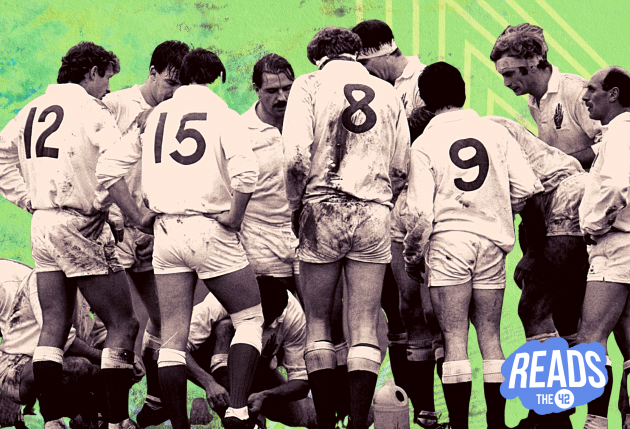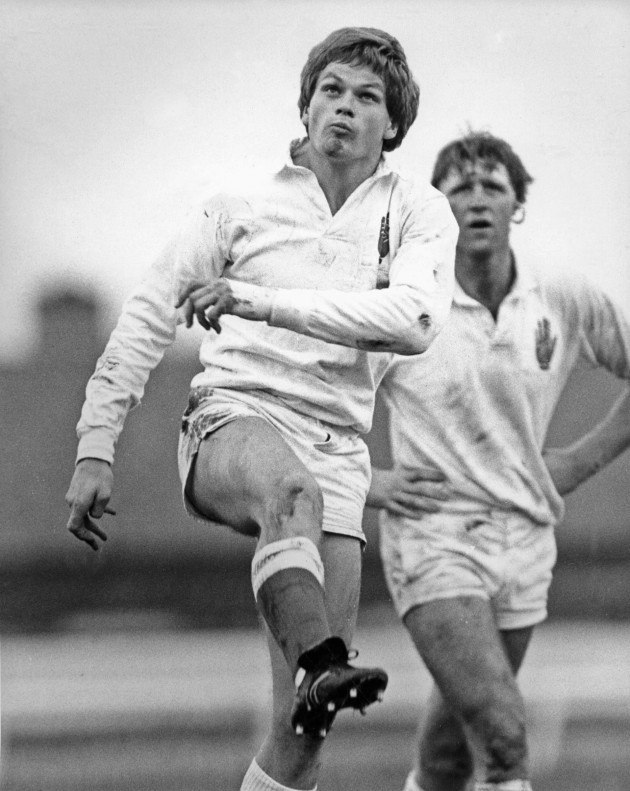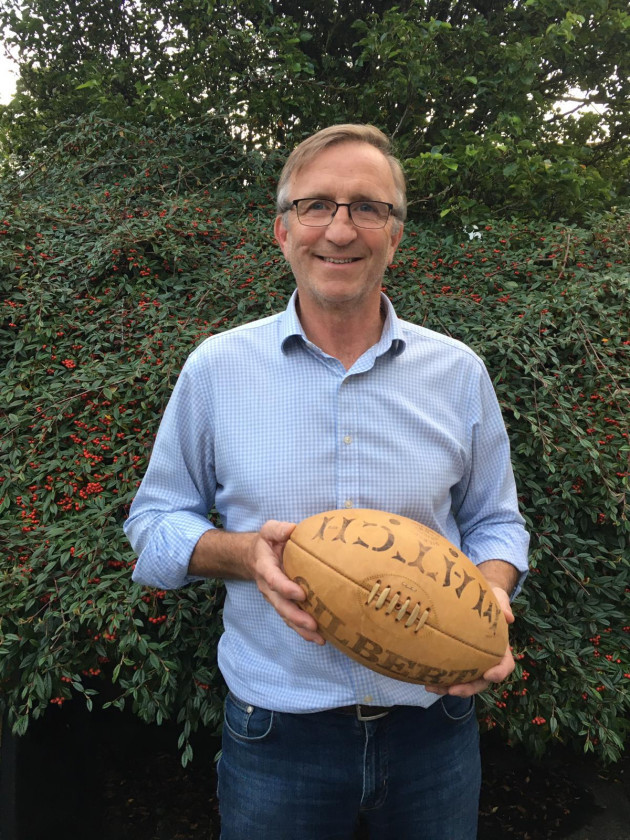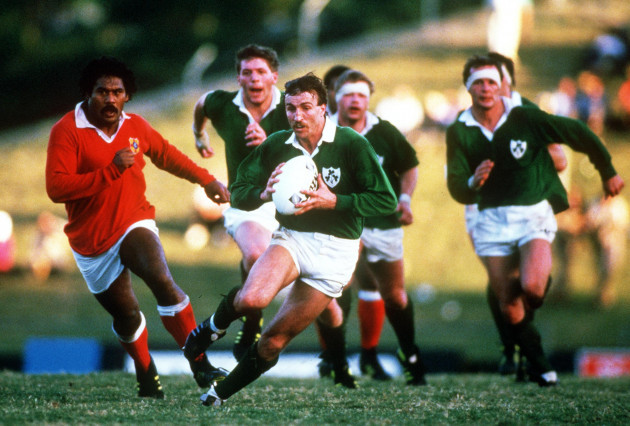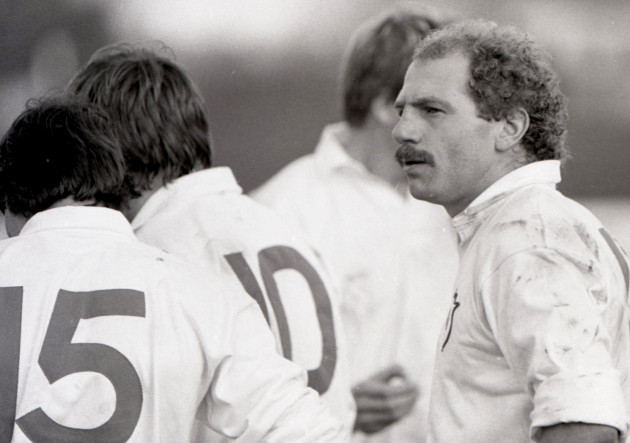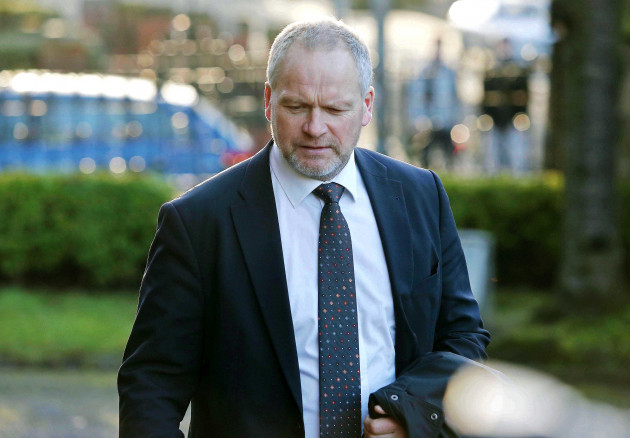ONE BRIGHT MORNING in Co Clare, a young rugby player used his soft, lyrical tones to deliver a brutal putdown.
“When you played Mister, were you a winger or a prop?”
There and then Trevor Ringland felt at ease. This was his kind of place: no pomposity, no posturing, and best of all, no politics.
Once, a long time ago, he had been a British and Irish Lion, a beloved winger (not a prop) on two of Irish rugby’s most cherished teams, the 1982 and 1985 Triple Crown sides. Now he was here, in Scariff Rugby Club, its clubhouse and pitches buzzing with life.
They’d been told this legend was coming and even if he was greyer, stouter and slower than people expected, as soon as he moved from the car park to the pitch, they could still spot a swagger to his step.
On the journey down from the North, he remembered a different time. He was a young man then, brimful of running. The roads his Ulster team travelled were single-lane not dual carriageway, a Garda escort flanking them at the front and the rear. Later, when the games were played and the kit put away, plain clothes policemen would blend into the crowd and watch over them protectively as they drank their pints and told their jokes. It sounds absurd now, but the lives of some Ulster players were at risk.
- For more great storytelling and analysis from our award-winning journalists, join the club at The42 Membership today. Click here to find out more >
Everyone knew it. Nothing was ever said but Trevor Ringland could tell by the way people stretched out their hands that he wasn’t just being welcomed in these southern towns and cities, but held in the highest esteem. That’s why he was back here, a few decades later, running around a pitch with a whistle, offering advice and encouragement.
“Mister,” the kid with the mousy hair asked again, changing tack with his questioning. “When you were young, did you ever play Munster?”
Smiling, Ringland remembered his battles with Michael Kiernan, Michael Bradley and Donal Lenihan. “Ten or 11 times, I think it was,” he replied to the boy.
“And did you ever beat them?”
Ringland paused, wondering how his answer would come across.
“To be honest, I never lost to them once.”
Nor did he ever lose to Connacht, nor, from 1984 on, to Leinster. Over a nine-and-a-half-year period, Ulster went 28 interpro games without defeat and that’s before we mention their wins against Australia, Italy, Fiji, Canada, Wellington, Samoa.
Before we do that, though, there’s a bigger victory to talk about.
**
EARL WARREN, the former chief justice of the United States, famously wrote how his preference each morning was to flick to the sports pages of his newspaper “and read about people’s accomplishments. Because the front page has nothing but stories of man’s failures”.
So it was in the Ulster of the 1980s, a decade filled with bombs, bullets and bitterness. Unemployment was high; tensions higher, half the population clearing out of the place in July, when the marching season was at its peak.
You could be fooled into thinking there were only two sides to this political argument but the truth is a bit more complex. Yes, there were republicans and loyalists, or their ideological cousins, nationalists and unionists, yet there was also a third, silent group: those of us disinterested in tribalism.
In our innocence we tried to pretend life was normal and that was the biggest trick Northern Ireland ever played on you. You could go to school, the shops, the cinema or even a match and convince yourself there was nothing different about living up there.
Except tragedy could occasionally strike. Sometimes someone never made it home.
You have funny ways of remembering things. When I spoke to the heroes of that all-conquering Ulster team last week, each conversation was warm, the players respectful, funny, intelligent, but whenever we mentioned The Troubles, our voices subconsciously lowered to a half-whisper, as if we were entering a twilight world where you felt the need to glance over your shoulder.
Then, as the chat veered back to sport, it felt different, the mind’s eye painting different images. No longer was it dark and drizzly, four o’clock on a November weekday; instead you pictured blue skies outside or smiling faces inside, sat around the TV.
That’s the thing about the North in the 1980s; there was often plenty to smile about, so long as you remembered to go to the sports pages first.
You had the Northern Ireland footballers who went to two World Cups, and just missed out on the ’84 European Championships, beating Spain, West Germany, Portugal and a Hagi-inspired Romania along the way. Derry City re-appeared from exile and won a Treble; Richard Dunwoody rode West Tip to the Grand National in ’86; Barry McGuigan united a nation and won a world featherweight title; Norman Whiteside got the winner for Manchester United in the FA Cup final; Alex Higgins and Dennis Taylor won world snooker championships. Down – my county, my team – won the 1983 National League.
Amid all this, the greatest rugby team Ulster ever produced beat the ’84 grand slam touring Wallabies, setting in train a sequence of results that lasted all the way through until 1993. “One of the best provincial teams in Irish rugby history,” says Des Fitzgerald, a Leinster stalwart from that era.
There’s no doubt about that. Nor is there any question that in history’s scrapbook, no other side is as underrated or undervalued.
**
DAVID IRWIN’S 41-year love affair with Ulster began in 1979. He played his rugby at Queen’s University, a perfect fit for a trainee doctor whose ambitions stretched way beyond the operating theatre. That Queen’s side may have been smaller than everyone else but they were also fitter, scrappier; more adventurous.
They had Irwin in the centre, Ringland on the wing, and a pair of flankers, Philip Mathews and Nigel Carr, whose names in time would be prefixed with a world class label. All four students became Lions. The remainder weren’t bad, either. Future Ireland internationals, Philip Rainey, Kenny Hooks and Brian McCall were complemented by three more players, Alan Irwin, Iain Moles and Rickie Stewart, who’d answer Ulster’s call.
Trophies came. The most prestigious of them all, the Ulster Senior Cup, was collected for the first time in 21 years but unbeknownst to all of them, they were on a pathway to something much bigger, moulded together by a visionary.
As a player, Jimmy Davidson was a hard man. As coach at Queen’s, he was softer. He wrote his players a personal letter at the end of each season, advising them how to improve. A lecturer in Stranmillis Teacher Training College, he was the first Irish rugby coach to introduce video review sessions, physical fitness an additional obsession.
Carr was the first to match that passion, honing his body into a state of impressive hardness. He was 19 when he first played for Ulster, his debut shared with another up-and-comer, future Ireland captain, Willie Anderson. “We had our fair share of losing games initially,” says Carr. “I remember one year Leinster hockeyed us 39-9 at Ravenhill.”
The gap would narrow. A tour to Romania brought the team closer together; Irwin and Ringland’s selection on the ’83 Lions tour offering the rest a glimpse of what was possible.
While Irwin says he finds it hard to pinpoint the X-Factor that made that Ulster team such a special one, Anderson isn’t shy in suggesting it was Davidson. Until he was plucked from Queen’s to become Ulster’s head coach, preparation was wing-and-a-prayer stuff. “We used to eat steak a couple of hours before each game,” says Carr, “which was madness clearly. The only reason we did it because the Ulster Branch was picking up the bill.”
There was no steak under Jimmy D; no mistakes, either. Collective training increased. “He challenged us,” said Ringland. “But he also listened. He recognised the qualities we had and made the most of those.”
It was Anderson who suggested they speed up their line-outs, to add tempo to their matches, thereby tiring the opposition. It was Carr who led the way on fitness, Keith Crossan and Irwin staying hot on his heels. “We all knew everyone was training seven days a week,” says Irwin. “There was a trust there.”
It paid off. Over the following decade, last minute scores became their thing. “It was like the Manchester United attitude under (Alex) Ferguson,” says Irwin. “A last minute try was worth the same value as one scored in the first minute.”
Everything was starting to click and on a dank November day in 1984, it all came together.
**
THE UNDERSTATED champion, who grew up in north Down, who shaped his days and nights around rugby, who first played for Ulster as a teenager but had to wait until his mid-20s for his international debut, who played a Test for the Lions, whose life was nearly lost in a car bomb, who made a conscious decision not to be bitter towards the bombers, whose neck still hurts from that explosion, takes you into his kitchen and greets you like a long lost friend.
The truth is we had met just once before, at a black tie dinner of all things, yet because he has a curious nature, our initial conversation quickly evolved from the option of beef or salmon to a discussion about the paradox of growing up in a British jurisdiction on an island called Ireland.
Nigel Carr is a generous man, generous with his time and also his emotions. The bomb didn’t just ruin his playing career but also impacted on his nine-to-five. A year after it stopped him playing in the 1987 World Cup, he had to leave his job as a forensic scientist because the role sometimes involved removing dead bodies from cars.
He went on to try something different and found himself becoming a different person. As a rugby player, he felt a need to portray himself as strong, a tough man. Things changed after the bomb. In his own words, he became more empathetic, a bit more tearful. Regrets? Yes, he has those. Anger? There isn’t a trace of it in his bones.
He remembers what he had, not what was taken away. Most of all, he remembers Australia 1984, coming back from a leg injury, getting a half-day off work, meeting the players at Knock Golf Club for a pre-match meal, walking around the Ravenhill pitch before kick-off, noting the length of the grass, the dreariness of the day.
He recalls the intensity of the play, the brilliance of a young Australian centre called Michael Lynagh and their replacement full-back, David Campese. He’ll never forget the roar when Philip Rainey and Ian Brown landed a couple of early kicks, the silence when the score drifted out to 13-6 in favour of the Wallabies, the cheer when Brown cut the gap to a point and then the nerves when a penalty was awarded seven minutes from the end.
“Chipper could kick it miles,” says Carr. “There was no question about Davy (Irwin, Ulster’s captain) letting him have a go at it.” The choice was vindicated. Chipper – aka Philip Rainey – found his target; Ulster had a 15-13 lead and seven minutes to defend it. Carr remembers the hardship of that time; the drive to get off the floor and put in one tackle after the next.
Rare Ulster v Australia 14 Nov 1984 Belfast Rugby Programme https://t.co/0dymjrdMQ9 please retweet pic.twitter.com/oIiDzJYkh2
— john edwardsen (@followbacksen) September 27, 2016
He remembers heading off to the Culloden Hotel for dinner that night, getting a taxi home, getting up for work the next day. “It is right to be humble,” he says now. “We could have lost it. Chipper’s kick was vital but it could have sailed past the post. We were a very able side. In the context of history, that was an exceptional run we went on. We just didn’t know it at the time. We didn’t know how good we were.”
**
PEOPLE STILL don’t. Ravenhill is now the Kingspan, shiny and new. You see signage for the Spirit of 99 suite, a nod to the province’s European Cup winning side from 22 years ago. “There’s nothing about us,” laments Anderson.
It’s a recurring issue across all sports. We just don’t celebrate our heroes in Ulster the way we should. That team of Carr’s, Anderson’s, Irwin’s and Ringland’s was one of the greatest in Irish rugby, and given the political turmoil of the time, one of the most important. Remarkably, sadly, brutally, few share that view.
You wonder why. Aside from Australia, Ulster also defeated Fiji, Canada, Samoa and Italy in that era. For context, Fiji reached the World Cup quarter-finals in 1987, Canada and Samoa getting to the last eight just four years later. Across those years, Canada beat Argentina, Scotland, Wales and even France. But not Ulster.
Part of the problem was rugby’s outdated structures; its calendar filled with challenge matches and tours, rather than formal competition. Outside the Five Nations, there was no other international tournament until the World Cup came along in 1987, while it took another eight years for someone to dream up the concept of a Heineken Cup. Had there been one in the ’80s, Ulster would have cleaned up.
“We certainly didn’t fear anyone,” says Irwin, noting how Wellington, winners of New Zealand’s National Provincial Championship in 1981 and 1986, were scalped, 29-14, when they came to Belfast in 1982.
Something else was beyond their control. Munster routinely lost to Ulster back then but it was Munster who got it together when it mattered, beating the All Blacks in ’78. Ulster, in contrast, couldn’t live with Zinzan Brooke et al in 1989. Had they got them in ’84, when Carr was still playing, when the team was at its peak, then who knows?
Quite possibly the ’84 Wallabies were a better side to the ’78 or ’89 All Blacks but any New Zealand scalp will always carry greater status.
The issue doesn’t bother Ringland or Irwin the way it does Anderson. They moved on, Ringland into law, later politics, Irwin to become Ulster club doctor for 30 years. “What we did back then just makes me so proud,” their former captain says. “It meant a huge amount trying to portray Northern Ireland or Ulster as a good place amid all the crap that was going on. Certainly as captain, I always felt the responsibility to bring some joy.”
He’d travelled to Spain to support Northern Ireland in the ’82 World Cup and without hesitation references the other success stories from that period, Higgins and Taylor in snooker, McGuigan and Dave McAuley in boxing, before surprising you with his recall for the GAA teams who also shone a light in that era, mentioning Antrim’s hurlers and their progress to the ’89 All-Ireland final.
Ringland too thinks deeply about what he and his side stood for.
The son of a policeman, he remembers the day when his father was shot at by republicans in North Belfast at the same time that loyalists were putting people out of their homes in his home-town in Larne.
“We got it badly wrong in the last century,” he says of Ireland’s troubled history. “We have to grasp the opportunity now to get it right. Both sides of the island are doing okay; will we move from good friendship to marriage? That’s for future generations to decide.
“I’m an optimist but when you ask about what it was like to be a young man back then, it is like an exam question. It’s like, ‘please discuss’. Do you know what? I feel lucky. Rugby brought me to different places, allowed me meet different people. If you want to look at relationships in this island, look at sport first before you look at everything else.
“Irish rugby, like other sporting stories, provided light when there was darkness. People gravitated towards that light for what it was. We kept relationships going.”
His brightest day wasn’t Australia; it wasn’t even when he played for the Lions or when he won the Triple Crown. It was when South of Scotland agreed to come to Belfast a week after Edinburgh Rugby Club had opted not to, after terrorist threats were made to British-based sides who planned to travel across. “That John Jeffrey and his South of Scotland boys came anyway was just inspiring to me,” says Ringland. “The night of the game there was a bomb scare in the hotel where we were drinking. The bar emptied. But Jeffrey and his pals were the last to leave, carrying their pints with them.”
In many ways that was Ulster Rugby’s biggest win, their maintenance of normality. Anyone could go and watch them on a Saturday afternoon. Sure, there’d be helicopters overhead and you’d encounter armoured cars en route to the stadium. But inside the gates, Ravenhill was no different to Thomond Park or anywhere else.
“Whenever I went to Cork or Limerick or Galway, people went out of their way to make sure that I, and my team mates, enjoyed ourselves,” Ringland says. “The way I see things, if you are at a rugby game or a GAA game, it is a very different tricolour and a very different anthem to the one the IRA wrapped around itself.
“Both symbols are meant to be inclusive. The St Patrick’s Cross is in the Union flag; the orange in the tricolour is there to represent Ulster’s orange tradition. Sport is inclusive. Rugby is. The GAA is. Football is. There is a lot of good stuff here on this island. If we get it right in the next century, it’ll be great.”
IF RUGBY WAS kind to them in their youth, growing old has brought its own challenges. There are aches and pains to contend with as they all enter their seventh decade. “Not enough to complain about, though,” says Ringland.
The boys from the ’80s regularly meet, although Covid called a halt to their twice-yearly dinners. Still, they grab a coffee together here and there, Irwin playing golf with Rab Brady on the day we talked. Friendships have endured. They remind one another of funny stories or great wins but deep down, they must wonder why their legacy hasn’t been suitably marked.
“I kind of get it,” Carr says, “because I remember meeting the 1948 Grand Slam winning team when I was a player and not really recognising their achievements at that time of my life. Now, as an older man, I appreciate more what that generation achieved. But I get how our achievements may seem dated.”
Tony Soprano would be in agreement. “Remember when is the lowest form of conversation,” sneered the character played by James Gandolfini in the final series of The Sopranos.
But is it?
If history ceases to matter, if tradition is to be sniffed at, then what have we left?
People need to realise what that team achieved and it can’t just be measured in trophies or ticks in a win/loss column. That Ulster side represented the best of us, carrying our hopes, shouldering our dreams. Not they were alone. Down, Derry City, McGuigan, Higgins, Taylor, they all took us away from a newspaper’s front page.
That’s success. May they never be forgotten.
For more great storytelling and analysis from our award-winning journalists, join the club at The42 Membership today. Click here to find out more >

